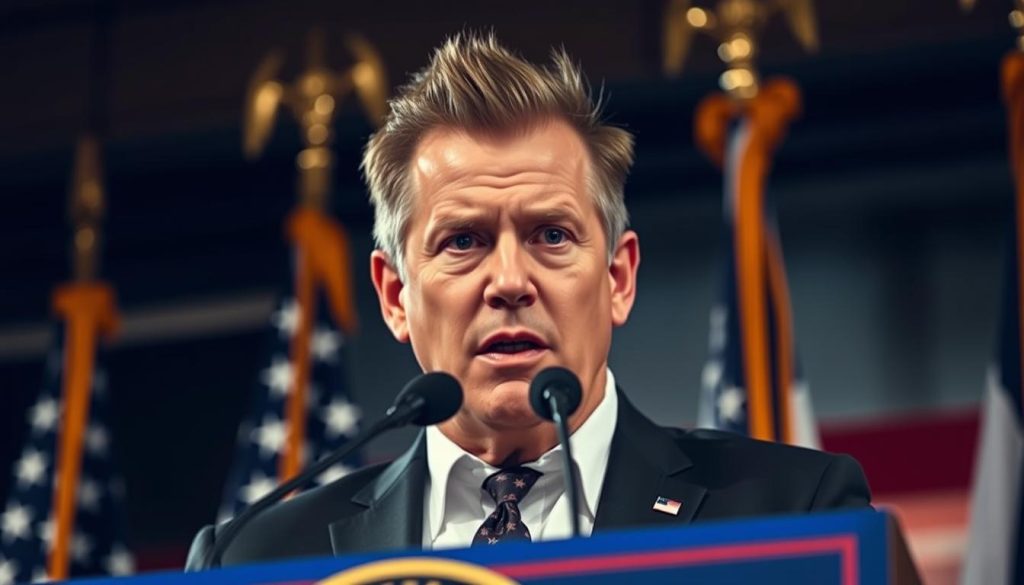During a morning press conference at the White House, President Trump used explicit language while discussing the ongoing conflict between Israel and Iran. As he prepared to depart for the NATO summit, Trump expressed frustration that both countries appeared to be violating a recently negotiated ceasefire agreement.
The President’s remarks were captured on live cameras and quickly spread across news outlets and social media platforms, marking a notable moment in presidential communications.
Key Takeaways
- President Trump used explicit language during an impromptu press conference.
- The incident occurred while discussing the Israel-Iran conflict.
- The President’s frustration stemmed from continued military actions despite diplomatic efforts.
- This marks an unusual break from traditional diplomatic language.
- The remarks were captured on live cameras and widely shared.
The Trump F Bomb Incident at the White House
A tense Tuesday morning at the White House ended with Trump dropping an F-bomb in front of reporters. The incident occurred as President Trump was preparing to depart for the NATO summit in The Hague. Reporters had gathered on the South Lawn to ask questions about various topics, including the developing situation between Israel and Iran.
The context of the incident is crucial. Here are the key points to understand what happened:
- The morning briefing was initially intended to cover Trump’s agenda for the NATO summit.
- Questions turned to the Middle East situation, catching White House staff off guard.
- Trump’s frustration seemed to stem from having to address a deteriorating situation just before an important international summit.
- The president’s comments came after he had received early morning intelligence briefings about overnight developments in the conflict.
Trump’s Exact Words to Reporters
Trump’s explicit language was caught on mic as he expressed disappointment about the continued attacks. His words reflected the frustration felt by the administration.
Tuesday Morning Context Before NATO Summit
The timing of the incident was significant as Trump was about to meet with NATO allies where the Middle East conflict was expected to be a major discussion point. The White House staff appeared unprepared for the president’s candid and explicit assessment of the situation.
Israel-Iran Ceasefire Violations
The ceasefire between Israel and Iran was short-lived, with both countries accusing each other of breaking the agreement within hours of its announcement. This fragile peace was put to the test almost immediately.
Bombing After Agreement
Israel’s defense systems were put on high alert after Iran launched missiles into its airspace. Israel claimed that Iran’s actions were unprovoked and violated the ceasefire.
Missile Launches into Israeli Airspace
In the early morning hours, Iran reportedly launched missiles into Israeli airspace. Israeli defense systems intercepted most of the missiles, though some impacts were reported in unpopulated areas. Iran claimed its actions were in response to Israel’s earlier bombing campaign.
Background of the “12-Day War”
The “12-Day War” was a pivotal conflict that drew in multiple nations and had significant global implications. It began as a bilateral conflict but soon escalated into a broader international crisis.
How the Conflict Started on June 13
The conflict started on June 13 with a series of confrontations that quickly intensified. Tensions between the involved nations had been building, and the situation eventually boiled over into violence.
U.S. Operation Midnight Hammer
On June 21, the U.S. became directly involved in the conflict with “Operation Midnight Hammer,” a precision
bombing of three nuclear sites in Iran. The administration identified these sites as critical facilities housing centrifuges and other equipment essential to uranium enrichment. The operation utilized advanced stealth technology to penetrate Iranian air defenses, representing a significant escalation of U.S. involvement. The administration justified the bombing as necessary to prevent nuclear proliferation in the region.
The White House released photos of the situation room during the operation, showing key administration officials monitoring the strikes. This operation marked a critical point in the conflict, highlighting the complexities and the high stakes involved.
Iran’s Attack on U.S. Military Base in Qatar
The incident involving Iran’s attack on a U.S. military base in Qatar raised several eyebrows due to the advance warning given to the United States. This unexpected move by Iran was a significant aspect of the event.
Limited Missile Strike Details
Iran launched a limited missile strike at the U.S. base in Qatar. The warning came through diplomatic back channels approximately three hours before the attack, allowing U.S. forces to take necessary precautions.
Advance Warning and No Casualties
The advance notice enabled U.S. forces to seek shelter and implement defensive measures. No casualties were reported, indicating a calculated decision by Iran to avoid direct military confrontation. The Trump administration acknowledged the warning, and Trump announced the details during a press briefing, highlighting Iran’s reluctance to escalate further.
Historical Context of Presidential Profanity
Presidential historians have long noted the contrast between public decorum and private language among U.S. presidents. While maintaining a composed public image, many have used profane language in private settings.
Notable Instances of Private Profanity
Several U.S. presidents have been known for their colorful private language. Presidents Harding, Grant, Truman, Johnson, and especially Nixon were noted for their profanity. The Nixon White House tapes revealed extensive profanity, contrasting sharply with his public persona.
Profane Language Under Pressure
Even President Jimmy Carter, known for his religious background, reportedly used the f-word when discussing the Shah of Iran. “He was under an enormous amount of pressure,” historian Riley noted, recounting how Carter weighed the decision to let Iran’s Shah come to the United States for medical care. “He just broke at one point and said, ‘F the Shah,'” Riley said.
Historians note that private profanity often reflected the extreme pressures of the job. The stress of international crises has historically led to more colorful language behind closed doors than in public statements.
Why This F-Bomb Is Different from Previous Presidential Language
Trump’s deliberate use of an F-bomb during official remarks has raised questions about the changing norms of presidential language. According to Russell Riley, a presidential historian at the Miller Center, this incident represents an unprecedented break from traditional constraints of the office.
The context of discussing two countries, Israel and Iran, engaged in conflict during official remarks makes this incident particularly notable. Trump told reporters his assessment of the situation with full awareness of being recorded, announcing his frustration with both nations’ violations of the ceasefire using language rarely heard in diplomatic contexts.
Social media and traditional media coverage highlighted how this incident breaks from historical norms of presidential communication. Experts predicted that Trump would “brazen it out” rather than apologize, suggesting a shift in what’s considered acceptable presidential language in official settings.
FAQ
What was the context of the incident involving President Trump’s use of profanity at the White House?
The incident occurred on Tuesday morning, prior to a NATO summit, during an exchange with reporters regarding the Israel-Iran ceasefire deal.
What were President Trump’s exact words to reporters during the incident?
President Trump used strong language, including a notable F-bomb, in response to a question about the ceasefire between Israel and Iran.
How did the international community react to the news of Israel’s bombing of Iranian nuclear sites?
The international community expressed concern over the escalation of violence, with some countries calling for restraint and a return to negotiations.
What was the significance of Iran’s missile launches into Israeli airspace?
Iran’s missile launches were seen as a response to Israel’s actions, and raised concerns about the potential for further escalation in the region.
What is the background of the conflict between Israel and Iran?
The conflict has its roots in a complex web of historical, political, and ideological factors, including disputes over nuclear sites and territorial claims.
How did the U.S. administration respond to the crisis between Israel and Iran?
The U.S. administration issued statements calling for a ceasefire and restraint, while also taking steps to support its allies in the region.
What is the historical context of presidential profanity in the United States?
Previous U.S. presidents have been known to use profanity in private and, on occasion, in public, but such incidents are relatively rare and often spark controversy.
Why is President Trump’s use of the F-bomb significant in this context?
The incident is notable because it involves a sitting U.S. president using strong language in a public setting, which is unusual and has sparked debate about the appropriateness of such language.



